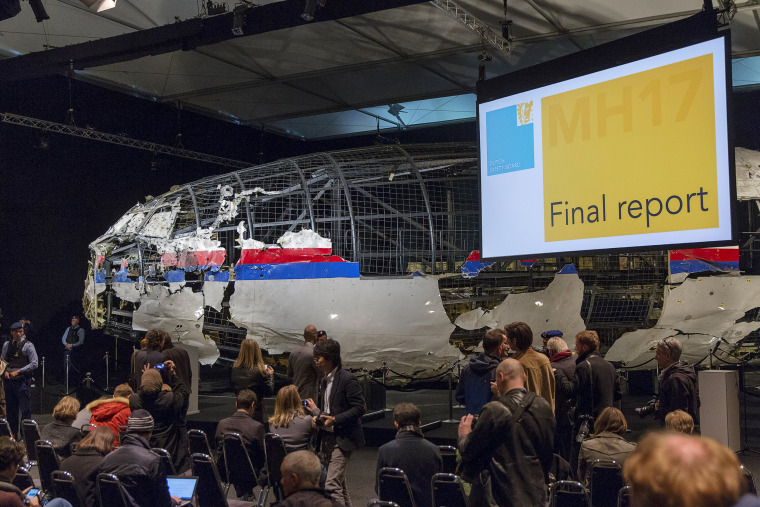Malaysia Airlines flight MH17 was downed by a Russian-made "warhead" fired from eastern Ukraine that detonated outside the jet's cockpit, Dutch investigators concluded in their final report Tuesday.
The findings of the Dutch Safety Board — which did not assign blame for the deadly crash — were announced at a press conference against the dramatic backdrop of the Boeing 777's partially reconstructed fuselage.
Tjibbe Joustra, chairman of the Dutch Safety Board, told those gathered that the crash was caused by "the detonation of a warhead" to the left of the cockpit.
Related: Russia Vetoes Bid for Tribunal Over Downed MH17
The warhead was a BUK surface-to-air missile — which is made in Russia.
Giving what was the most detailed description of the jet's final moments to date, Joustra said the explosion killed the plane's three crew members in the cockpit and that investigators had found "high energy fragments" in their bodies.

The blast — less than one yard from the plane's fuselage — also caused "structural damage," which resulted in the jet's "forward part" tearing off. The plane broke up in midair and scattered over a 20-square-mile area, he said.
Flight MH17 crashed in eastern Ukraine, where government troops have been locked in a grinding conflict with pro-Russian rebels. Ukraine and its Western allies have long accused the rebels of shooting down the aircraft using the BUK Russian weapons system mentioned in the Dutch report, a charge Moscow has repeatedly denied.
Russia's Deputy Foreign Minister Sergei Ryabkov echoed these denials on Tuesday, calling the Dutch report an "obvious attempt to draw biased conclusions," according to the country's state-run news agencies.
Ryabkov said the investigation should have included findings by Almaz-Antey, the company that manufactures the BUK missile syste, which had issued its own report hours before.
The Russian manufacturer said its own tests involved detonating a BUK missile near the nose of an aircraft similar to a Boeing 777, but that the damage patterns were different to those seen in MH17, according to Reuters.
The Dutch Safety Board's report also criticized Ukraine authorities — as well as airlines and other countries — for not recognizing the risks in flying over the conflict zone in the east of the country.
Two military aircraft were shot down in the three days before MH17's crash, the report said, adding that this should have "provided sufficient reason for closing the airspace above the eastern part of Ukraine as a precaution."
"The aviation parties involved did not adequately recognize the risks of the armed conflict," the report said.
The safety board's chairman told the press conference that because of the armed conflict in Ukraine, there would have been "sufficient reason to close the airspace as a precaution" but "the Ukraine authorities failed to do so."
The press conference was also shown a computer reconstruction of the plane's final voyage.
The airliner was flying from Amsterdam to Kuala Lumpur on July 17 last year when it came down over eastern Ukraine. All 298 people on board were killed.
